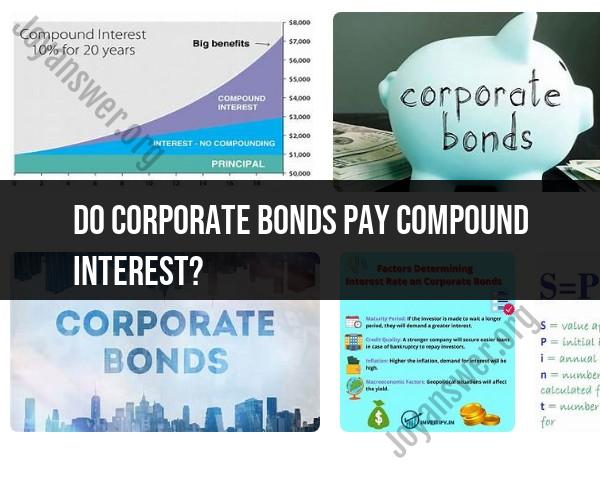Do corporate bonds pay compound interest?
Corporate bonds typically pay simple interest, not compound interest. Simple interest is calculated only on the principal amount (the initial investment) for a specific period, and it does not take into account any interest that may have accrued in previous periods.
The formula for calculating simple interest is:
Where:
- Principal is the initial amount invested.
- Interest Rate is the annual interest rate.
- Time is the time the money is invested or borrowed, expressed in years.
In the case of corporate bonds, the bondholder receives periodic interest payments (coupon payments) based on the face value of the bond and the stated interest rate. These payments are typically made semiannually.
It's important to note that the interest earned or paid on corporate bonds is not added to the principal for subsequent interest calculations. In other words, the interest is not compounded over time.
If you're looking for compound interest, it is more commonly associated with savings accounts, certificates of deposit (CDs), and certain types of investments where interest is reinvested and earned on both the principal and any previously earned interest.
When investing in corporate bonds, investors receive regular interest payments based on the bond's face value and interest rate, but the interest is not compounded unless the investor reinvests the interest payments in additional bonds or other interest-bearing instruments.
When it comes to corporate bonds, understanding the intricacies of interest payments is crucial for making informed investment decisions. Let's delve into the world of interest and shed light on its role in your bond portfolio:
1. Compound or Simple? Neither:
Unlike some other investments like savings accounts, corporate bonds do not pay compound interest. They generally pay out a fixed coupon rate, calculated as a percentage of the bond's face value, periodically (usually semi-annually). This interest earned is not then reinvested to generate further interest, as in compound interest scenarios.
2. The Common Calculation Method:
The most common interest calculation method for corporate bonds is the straight-line method. This involves:
- Multiplying the bond's coupon rate by the face value to determine the periodic coupon payment amount.
- Dividing the accrued interest by the number of days in the interest payment period.
- Multiplying the daily accrued interest by the number of days held by the investor to calculate the interest earned during that period.
3. Nuances and Variations:
While the straight-line method is common, you might encounter some variations:
- Zero-coupon bonds: These do not pay periodic interest but mature at a premium above their face value. Your return comes solely from the price appreciation at maturity.
- Floating-rate bonds: Their interest rate fluctuates based on a benchmark interest rate, like LIBOR.
- Deferred-interest bonds: These postpone interest payments until a later date, often offering a higher redemption value at maturity.
4. The Power of Reinvestment:
While corporate bonds themselves don't offer compound interest, investors can reinvest their earned coupon payments into other interest-bearing instruments. Over time, through consistent reinvestment, these earnings can compound and significantly contribute to your portfolio's growth.
5. Considerations for Bondholders:
Remember:
- Call features: Some bonds grant the issuer the right to redeem them before maturity, potentially impacting your interest income.
- Default risk: If the issuer defaults, your interest payments and principal repayment might be jeopardized.
- Tax implications: Bond interest is generally taxable as income.
By understanding the nuances of interest payments and employing prudent strategies like reinvestment, you can leverage corporate bonds to build a robust and profitable portfolio. Remember, careful research and analysis are key to navigating the intricate world of fixed-income investments and maximizing your returns.












